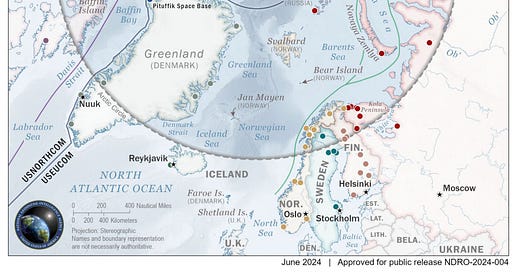Arctic Power and NATO Strategy on the Cold Front
The Arctic Military Transport Corridor, Trump, and Satellites
The leaders of Sweden, Norway, and Finland attended a meeting in June (2024) to discuss the rising military and geopolitical importance of the Arctic region wherein establishment of a “military transport corridor” had been mutually deemed necessary for logistical operability of NATO allies traversing the Northern regions of three countries.
While the US military has maintained a steady presence in long-standing NATO member-state Norway since 2017, the inclusion of Finland and Sweden in the alliance provide the West with unprecedented maneuverability in the Arctic zone. In light of escalated conflict between NATO forces and Russia, the additions to the alliance were strategic not only in timing but in location as well due to all three nations sharing a border with the big bad bear of the East.

The values of securing Arctic control have long been recognized by foreign policy agencies as a vital asset for trade and defense, though it garnered practically no public attention before President Trump’s recent comments expressing the possibility of US acquisition of Greenland. DC policies in the 1980’s show a particularly distinct understanding of the strategic advantage of the Arctic through acts such as the Arctic Research and Policy Act of 1984 which states that “most Arctic-rim countries, particularly the Soviet Union, possess Arctic technologies far more advanced than those currently available in the United States.” This statement was altered a decade later in compliance with the FRIENDSHIP Act with the aim of easing international tension.
The newfound attention awarded to Greenland is more predictable than it appears at first glance. One reason for this is the Greenland–Iceland–UK (GIUK) gap. Think of it as a sort of icy Suez Canal with the major difference being its geographic location as well as being a natural phenomenon rather than an artificial construction. If Greenland were to be annexed as Trump has proposed, control of the GUIK would be effectively secured.
I personally oppose hegemony in all its forms and the Prime Minister of Greenland, Mute Borup Egede, seems to share the opinion. In response to rhetoric advocating US annexation of Denmark, he detailed some of the injustices Greenlanders already face as an autonomous territory rather than a sovereign nation, emphasizing the importance of national autonomy stating,"We don't want to be Danes, we don't want to be Americans, we want to be Greenlanders, this doesn't mean that we are cutting off all ties with Denmark.” Whether or not his statement will be considered in any significant regard remains to be seen but I wouldn’t bet on it. That said, I absolutely do not anticipate Greenland entering under direct US control. There simply isn’t a need for such a transition when the US is already in a position of power via Denmark, to which Greenland is subservient.

Glossing over the obvious advantage of Greenland’s natural resources (I think the mainstream media has that pretty well covered), I do think it pertinent to point out that the region is a vital hub for advanced satellite technology. Strategic placement of polar satellites allows for advanced surveillance capabilities and well as the ability to oversee and interfere with global communication systems. Under the guise of environmental concerns, governments in both the East and West have been investing in the development and infrastructure of this tech heavily for decades.
additional sources
-The Shultz Report by M. Shultz




